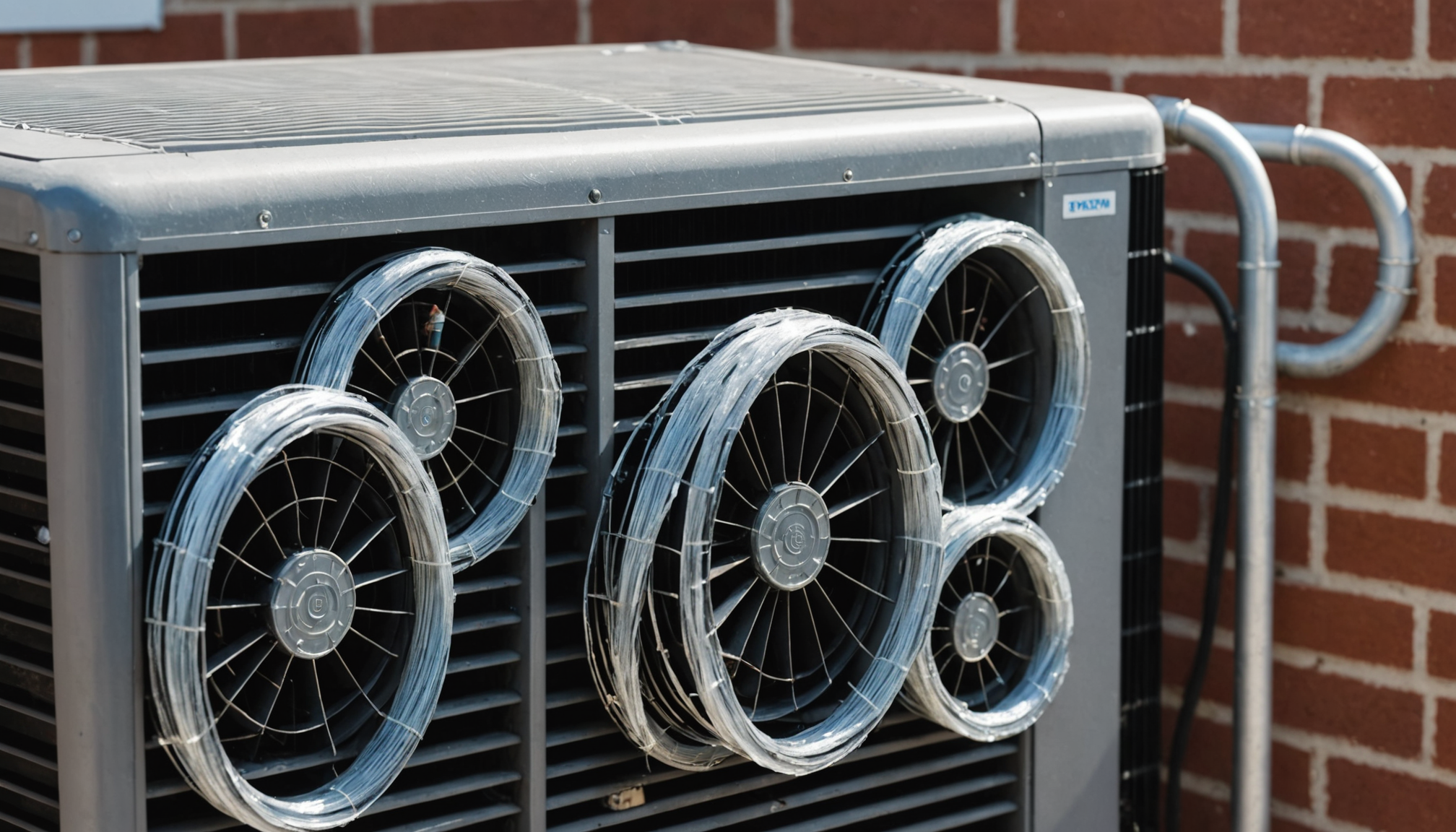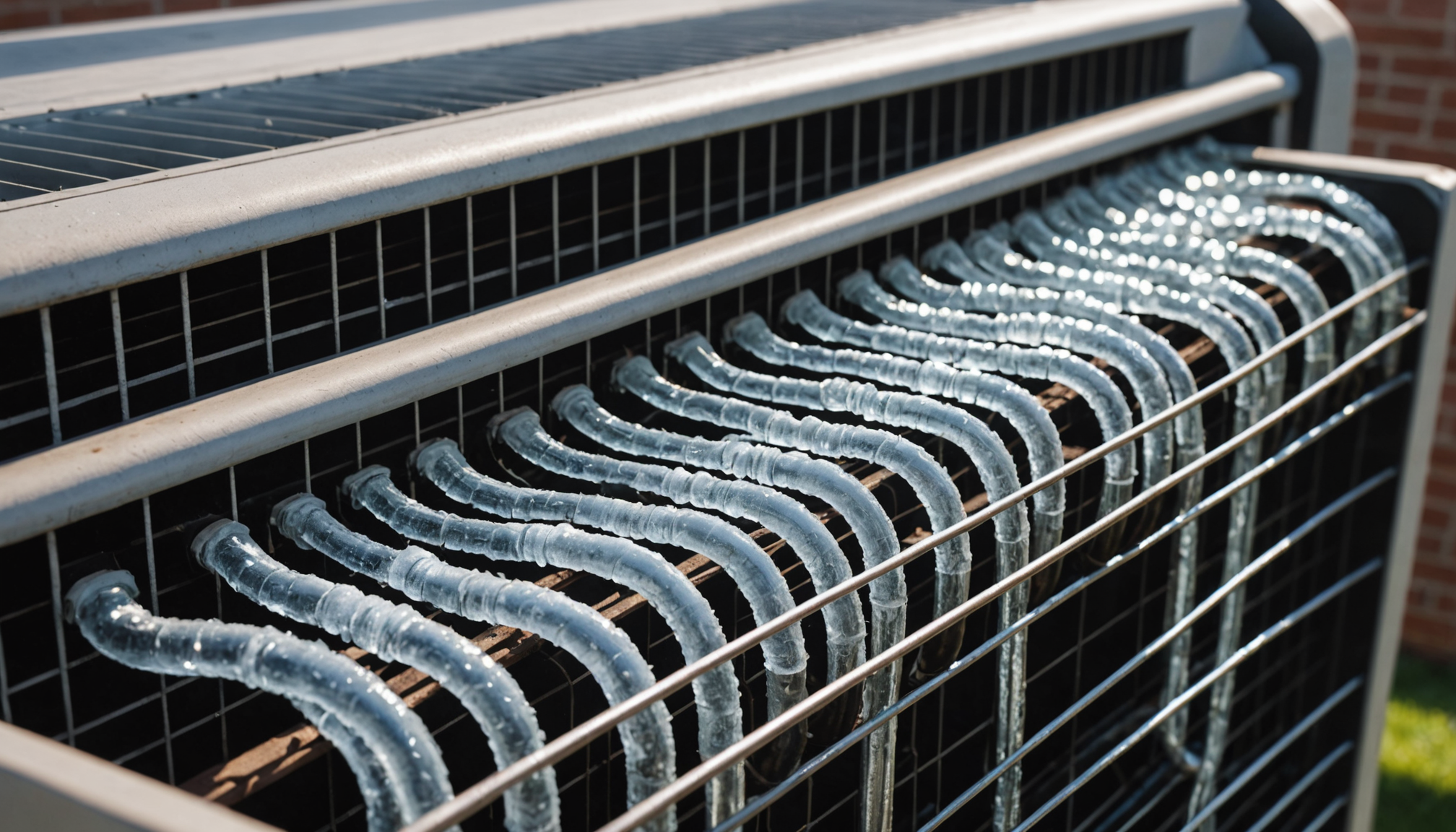The oppressive heat of a St. Louis summer can push even the most robust air conditioning systems to their limits, sometimes leading to the unwelcome phenomenon of an A/C unit freezing up. While it may seem counterintuitive—ice forming on a mechanism designed to cool—this issue is alarmingly common and can quickly escalate into a larger problem if not addressed promptly. Understanding the root causes of A/C freezing is pivotal for homeowners who rely on consistent cooling performance during the peak heat of summer. The aim here is to help you understand what’s going wrong and why it matters to get a handle on the situation before it worsens.
One of the primary culprits behind A/C freezing is inadequate airflow. Your system requires a steady stream of air over the evaporator coil to function efficiently. If airflow is obstructed—perhaps by a dirty filter, grimy coil, or clogged ductwork—the temperature of the refrigerant within the coil can plummet below freezing. This leads to ice accumulation and can even result in complete operational shutdown. According to the U.S. Department of Energy, clogged filters can reduce a system’s efficiency by up to 15%, making it crucial to check and replace filters every one to three months, especially during peak usage.
Low refrigerant levels are another frequent offender in the A/C freezing scenario. This condition can occur due to an overlooked leak in the system, which results in insufficient refrigerant to absorb and dissipate heat effectively. The reduced pressure causes the refrigerant to expand more rapidly, cooling the evaporator coil below its intended temperature range and causing ice build-up. HVAC technicians often liken this to trying to boil water with only a small flame; the desired result takes longer and can stall entirely under suboptimal conditions. Regular system checks are integral to ensure that refrigerant levels remain consistent and leaks are promptly addressed.
A malfunctioning blower fan can also contribute to freezing issues. This component is responsible for pushing air over the evaporator coil. If the blower is defective or operates at a reduced capacity—often due to worn bearings or faulty motor—the airflow suffers, leading to the same freeze-prone environment as an obstructed filter scenario. Troubleshooting an air conditioning system with a compromised blower typically requires a professional inspection to accurately pinpoint and resolve the issue.
Another factor, particularly relevant to humid environments like St. Louis, is excessive moisture in the air. High humidity conditions can contribute to condensation forming on the evaporator coils at a faster rate than normal. When combined with any of the previously mentioned issues, this moisture can freeze quickly. Installing a dehumidifier can often alleviate this additional stress on your air conditioning system by reducing the overall moisture content in the air and optimizing cooling efficiency.
Understanding the common causes of A/C freezing empowers you to potentially prevent them, ensure your cooling system runs smoothly, and maintain comfort in your home even during the relentless St. Louis heat. Regular maintenance, timely filters and refrigerant level checks, and proactive system inspections stand out as the best preventive measures. When in doubt, make sure to consult an HVAC professional who can offer tailored solutions for your specific system and needs.
Identifying the first signs of a freeze
Catching the early signs of an air conditioning freeze-up can prevent a small issue from becoming a costly repair. Homeowners in St. Louis, already dealing with high temperatures, should be particularly vigilant in monitoring their systems for indications that might suggest freezing is imminent. One of the first and most apparent signs of a problem is reduced airflow coming from your vents. If your A/C unit is running, but the air output seems weak, it could point to ice forming on the evaporator coil, obstructing airflow.
Another telltale sign is an increase in utility bills without a corresponding increase in usage. When your air conditioning system begins to freeze, it has to work harder to provide the same level of cooling, inevitably using more energy. This inefficiency is often reflected in higher energy costs.
Visible ice on the refrigerant line or evaporator coil is a definitive sign of freezing issues. Regularly checking these components and identifying ice or frost buildup can help you react quickly before more extensive damage occurs. Additionally, water dripping or pooling around your indoor unit can indicate that ice is melting and causing condensation to overflow from the drainage system.
Finally, if your A/C unit begins to short cycle—turning on and off more frequently than usual—it might be a sign that the system is freezing up. Short cycling not only affects your comfort but also puts additional stress on the system, potentially leading to mechanical failure if not addressed promptly.
Homeowners need to remain vigilant and address these signs immediately, either by scheduling regular maintenance or seeking professional assistance for more complex troubleshooting. Ice accumulation is more than an inconvenience; it’s a call to action to inspect your HVAC system.
- Look for reduced airflow from vents, which may indicate ice blockage.
- Monitor energy bills; a sudden spike could suggest the system is overworking.
- Check for visible ice on refrigerant lines or evaporator coils.
- Be aware of water dripping around the indoor unit as it might indicate melting ice.
- Notice if your air conditioning is short cycling; it might be a sign of freezing issues.
Immediate steps to take
Should you notice any of the early signs of freezing, take swift action to prevent further damage and restore optimal function to your air conditioning system. First, power off the system to prevent excess strain on its components. Turning off the A/C allows any ice that has already formed to begin melting, which is crucial for addressing the root cause of the issue later.
Next, verify that your air filter is clean, as a clogged filter is one of the most common causes of restricted airflow. If it’s dirty or hasn’t been replaced recently, swap it out for a new one. This simple measure can significantly improve airflow and help your system operate more efficiently.
After this, inspect the air vents and registers to ensure they are open and unobstructed. Sometimes furniture, curtains, or other household items can inadvertently block these, restricting air circulation and contributing to freezing issues. Ensure all vents are fully open and free from any obstructions.
Once the system is off and airflow has been addressed, allow adequate time for any accumulated ice to melt naturally. It’s recommended to wait for a few hours before turning the air conditioning back on. Keep in mind that forcing the system to run while frozen can lead to more severe problems, such as damaging the compressor, which often results in costly repairs.
While waiting, check the refrigerant line for any ice or frost. If frosty, it signals that low refrigerant levels might be the culprit. Although this requires professional assessment and correction, taking note of its presence helps relay valuable information to an HVAC technician when one is called.
If after these steps the freezing issue persists or if you’re unsure how to advance safely, it’s wise to contact an HVAC professional. They can conduct a thorough inspection to identify underlying problems, such as refrigerant leaks or blower fan issues, and provide appropriate solutions. Remember, early intervention and expert evaluation will save time, reduce costs, and ensure your air conditioning runs efficiently in the St. Louis heat.
Preventative measures for hot climates
Keeping your air conditioning system in optimal condition during the intense St. Louis heat requires proactive preventative measures. The primary goal is to maintain steady airflow and ensure system components remain clean and efficient. Begin by making routine HVAC maintenance a priority. Regular inspections and tune-ups, at least once a year, allow for early identification of potential issues like refrigerant leaks or failing parts that could lead to freezing.
One straightforward yet effective practice is frequently checking and replacing air filters. During peak usage months, such as the hot summers in St. Louis, this might mean inspecting filters every month. Ensuring they are clean prevents obstructed airflow and helps the evaporator coil work efficiently. Additionally, investing in high-quality filters can improve your home’s air quality and enhance your system’s performance.
Do your best to keep the outdoor unit clear of debris such as leaves, grass, and dirt, which can accumulate over time and hinder airflow. It’s equally important to maintain clear space around the unit. Two to three feet of clearance ensures that air circulates freely, preventing the system from overheating and reducing the risk of freeze-ups.
In hot and humid environments, considering a system with a variable speed blower motor can be beneficial. These systems adjust their speed based on cooling demand, which helps maintain consistent airflow and prevents ice buildup on the evaporator coils. Although this might represent a larger upfront investment, the energy savings and prolonged lifespan of your unit often justify the cost.
For those who face chronic humidity issues, a whole-home dehumidifier might be a wise addition to your HVAC setup. By reducing indoor humidity levels, you alleviate one of the stressors that contribute to freezing in air conditioning systems. This solution not only protects your system but also enhances overall comfort within your living space.
Ultimately, your best defense against A/C freezing is vigilance and proactive care. By adopting these preventative strategies, you prepare your system to handle the relentless heat of St. Louis summers smoothly. Stay committed to regular maintenance and timely troubleshooting, and you’ll keep your cooling system operating efficiently and your home comfortable. Remember, conquering the St. Louis heat isn’t just about understanding your air conditioning system—it’s about staying one step ahead. Embrace these measures, and enjoy the serenity of a cool, efficient home.
When to call a professional
- How do I know when to call a professional for A/C freezing issues?
- If you notice persistent issues such as ice forming on the evaporator coils or refrigerant lines, weak airflow despite a clean filter, or the system not cooling your home effectively even after taking initial troubleshooting steps, it’s time to call a professional. A qualified HVAC technician can conduct a thorough inspection and diagnose problems like low refrigerant levels or blower fan malfunctions.
- What are the risks of not addressing a freezing A/C unit promptly?
- Ignoring a freezing A/C unit can lead to more severe damage, such as compressor failure, which is a costly repair. Additionally, an inefficient system works harder to cool your space, leading to higher energy bills and increased wear on its components over time.
- Can I fix A/C freezing issues myself, or do I need professional help?
- While you can address some minor issues yourself, such as replacing a dirty air filter or ensuring vents are open and unobstructed, most freezing problems require professional attention. An HVAC technician can accurately assess deeper issues like refrigerant leaks, mechanical faults, or deficient airflow that might not be evident through basic troubleshooting.
- How can a professional help prevent future freezing of my A/C unit?
- A professional can provide routine maintenance checks to ensure your system components are in top condition. They will look for common culprits like refrigerant leaks and clogged ductwork, and offer advice on optimizing your system for local climatic conditions, like those in St. Louis.
- How often should I schedule professional maintenance for my air conditioning system?
- It’s recommended to have your air conditioning system professionally inspected and serviced at least once a year. However, in hotter climates like St. Louis, scheduling maintenance semi-annually, before and after peak usage seasons, can help keep your system running smoothly and prevent issues like freezing.

